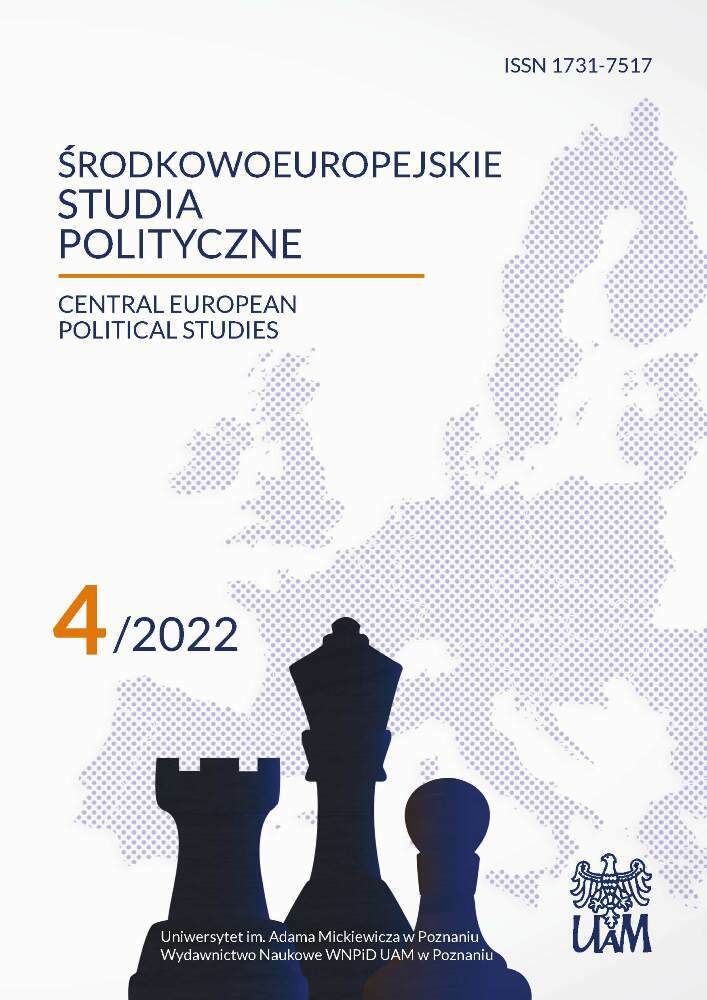Abstrakt
Przedmiotem artykułu jest ryzyko użycia broni jądrowej przez Rosję w kontekście wojny na Ukrainie. Celem artykułu jest analiza i ocena takiej możliwości z perspektywy amerykańskiej. Głównym problemem badawczym jest, czy według amerykańskich naukowców i ekspertów realne jest użycie przez Rosję broni jądrowej przeciwko Ukrainie lub państwom NATO? Z perspektywy Zachodu nie można wykluczyć takiej możliwości, jednak znakomita większość badaczy i analityków uważa, że ryzyko takie jest bardzo niewielkie. Jeśli do tego dojdzie, to prawdopo dobnie będzie to wykorzystanie taktycznej broni jądrowej przeciwko celom wojskowym w Ukrainie. Mniej prawdopodobne jest wystrzelenie taktycznej broni jądrowej przeciwko elementom infrastruktury wykorzystywanej do przesyłu z Zachodu broni dla Ukrainy, zlokalizowanej w państwach wschodniej flanki NATO. W ramach badań wykorzystano wywiady przeprowadzone przez autora w Waszyngtonie i Nowym Jorku oraz ekspertyzy amerykańskich think-tanków. Analiza przeprowadzona została w perspektywie paradygmatu neorealizmu ofensywnego.
Bibliografia
Atlantic Council experts (2022), Will Putin use nuclear weapons in Ukraine? Our experts answer three burning questions, 10.05.2022, Atlancic Council, https://www.atlanticcouncil.org/blogs/new-atlanticist/will-putin-use-nuclear-weapons-in-ukraine-our-experts-answer-three-burning-questions/, 12.08.2022.
Banasik M. (2022), Odstraszanie strategiczne mechanizmem prowadzenia przez Federację Rosyjską rywalizacji międzynarodowej, „Przegląd Wschodnioeuropejski”, no. 1, vol. 13. https://doi.org/10.31648/pw.7664 DOI: https://doi.org/10.31648/pw.7664
Betts R. K. (2022), Interview given to the author, Columbia University, New York, 28.04.2022.
Biddle S. (2022), Interview given to the author, Columbia University, New York, 5.05.2022.
Cohen R. S. (2022), The Return of ‘Don’t Poke the Bear’, 3.06.2022, RAND Corporation, https://www.rand.org/blog/2022/06/the-return-of-dont-poke-the-bear.html, 12.08.2022.
Cordesman A. H. (2022a), The Longer-Term Impact of the Ukraine Conflict and the Growing Importance of the Civil Side of War, June 6, 2022, Center for Strategic and International Studies, https://www.csis.org/analysis/longer-term-impact-ukraine-conflict-and-growing-importance-civil-side-war, 12.08.2022.
Cordesman A. H. (2022b), The Need for a New NATO Force Planning Exercise, 14.07.2022, p. 2–3, Center for Strategic and International Studies, https://www.csis.org/analysis/need-new-nato-force-planning-exercise, 15.08.2022.
Djatkoviča E. (2022), From the Migrant Crisis to Aggression in Ukraine: Belarus is Still on the Baltic Agenda, 1.07.2022, Foreign Policy Research Institute, https://www.fpri.org/article/2022/07/from-the-migrant-crisis-to-aggression-in-ukraine-belarus-is-still-on-the-baltic-agenda/, 12.08.2022.
Doyle M. (2022), Interview given to the author, Columbia University, New York, 27.04.2022.
Frederick B., Charap S., Boston S., Flanagan S. J., Mazarr M. J., Moroney J. D. P., Mueller K. P. (2022), Pathways to Russian Escalation Against NATO from the Ukraine War, RAND Corporation, 07.2022, https://www.rand.org/pubs/perspectives/PEA1971-1.html, 12.08.2022.
Glaser Ch. (2022), Interview given to the author, George Washington University, Washington D.C., 25.04.2022.
Goldgeier J. (2022), Interview given to the author, American University, Washington D.C., 16.05.2022.
Guzzini S. (2018), Hans J. Morgenthau and the three purposes of power, Danish Institute for International Studies, Copenhagen.
Harding L. (2022), Putin could use nuclear weapon if he felt war being lost – US intelligence chief, “The Guardian”, 10.05.2022, https://www.theguardian.com/world/2022/may/10/putin-nuclear-weapons-us-intelligence-avril-haines.
Hastings M. (2022), Putin May Win in Ukraine, But the Real War Is Just Starting, 19.06.2022, Bloomberg, https://www.bloomberg.com/opinion/articles/2022-06-19/russia-ukraine-war-putin-is-winning-but-the-us-and-europe-must-act, 12.08.2022.
Hoffman F. G. (2022), America Needs a Comprehensive Compellence Strategy Against Russia, 28.04.2022, Foreign Policy Research Institute, https://www.fpri.org/article/2022/04/america-needs-a-comprehensive-compellence-strategy-against-russia/, 12.08.2022.
Hooker R. D. (2022), A no-fly zone over Ukraine? The case for NATO doing it, 18.03.2022, Atlantic Council, https://www.atlanticcouncil.org/blogs/new-atlanticist/a-no-fly-zone-over-ukraine-the-case-for-nato-doing-it/, 12.08.2022.
Johnson D. D. P., Thayer B. A. (2016), The evolution of offensive realism. Survival under anarchy from the Pleistocene to the present, “Politics and the Life Sciences”, vol. 35, no. 1. https://doi.org/10.1017/pls.2016.6 DOI: https://doi.org/10.1017/pls.2016.6
Kmiecik P. (2013), Realizm strukturalny ofensywny, defensywny i zależny, 26.11.2013, nowastrategia.org.pl, https://www.nowastrategia.org.pl/realizm/, 15.08.2022.
Lamy S. L. (2008), Współcześnie dominujące podejścia badawcze: neorealizm i neoliberalizm, tł. M. Filary, in: Globalizacja polityki światowej. Wprowadzenie do stosunków międzynarodowych, eds. J. Baylis, S. Smith, Wydawnictwo Uniwersytetu Jagiellońskiego, Kraków.
Lebovic J. H. (2022), Interview given to the author, George Washington University, Washington D.C., 11.05.2022.
Mearsheimer J. J. (2001), The Tragedy of Great Power Politics, W.W. Norton & Company, New York.
NATO 2022 Strategic Concept (2022), Madrid, 29.06.2022, p. 4, NATO, https://www.nato.int/strategic-concept/, 10.08.2022.
Mearsheimer J. J. (2022), Playing With Fire in Ukraine. The Underappreciated Risks of Catastrophic Escalation, 17.08.2022, Foreign Affairs, https://www.foreignaffairs.com/ukraine/playing-fire-ukraine, 18.08.2022.
Morcos P. (2022), Interview given to the author, Center for Strategic and International Studies, Washington D.C., 11.05.2022.
Pifer S. (2020), US nukes in Poland are a truly bad idea, 18.05.2020, Brookings Institution, https://www.brookings.edu/blog/order-from-chaos/2020/05/18/us-nukes-in-poland-are-a-truly-bad-idea/, 12.08.2022.
Pifer S. (2022), Interview given to the author, Brookings Institution, Washington D.C., 29.04.2022.
Polyakova A., Lucas E., Lo B., Lamond J., Speranza L. (2022), What Does Europe Look Like 3–7 Years After Russia’s War in Ukraine?, 24.05.2022, Center for European Policy Studies, https://cepa.org/what-does-europe-look-like-3-7-years-after-russias-war-in-ukraine/, 12.08.2022.
Roberts C. (2022), Interview given to the author, Columbia University, New York, 13.05.2022.
Sokov N. (2020), Russia Clarifies Its Nuclear Deterrence Policy, VCDNP, 3.06.2020, Vienna Center for Disarmament and Non-Proliferation, https://vcdnp.org/russia-clarifies-its-nuclear-deterrence-policy/, 15.08.2022.
Pszczel R. (2022), The consequences of Russia’s invasion of Ukraine for international security – NATO and beyond, 7.07.2022, NATO Review, https://www.nato.int/docu/review/articles/2022/07/07/the-consequences-of-russias-invasion-of-ukraine-for-international-security-nato-and-beyond/index.html, 15.08.2022.
Sestanovich S. (2022), Ukraine Should Wait on Cease-Fire Talks With Russia. Here’s Why, 24.05.2022, Council on Foreign Relations, https://www.cfr.org/in-brief/ukraine-should-wait-cease-fire-talks-russia-heres-why, 12.08.2022.
Tardy T. (2022), War in Europe: preliminary lessons, “NDC Research Paper”, no. 23, p. 6, NATO, Defense College, https://www.ndc.nato.int/news/news.php?icode=1696, 15.08.2022.
The President of the Russian Federation (2020), Basic Principles of State Policy of the Russian Federation on Nuclear Deterrence, Moscow, 2.06.2020, The Ministry of Foreign Affairs of the Russian Federation, https://archive.mid.ru/en/web/guest/foreign_policy/international_safety/disarmament/-/asset_publisher/rp0fiUBmANaH/content/id/4152094, 10.08.2022.
Toft P. (2005), John J. Mearsheimer: an offensive realist between geopolitics and power, “Journal of International Relations and Development”, vol. 8. https://doi.org/10.1057/palgrave.jird.1800065 DOI: https://doi.org/10.1057/palgrave.jird.1800065
Waltz K. N. (1979), Theory of International Politics, Random House, New York.
Licencja
Prawa autorskie (c) 2022 Łukasz Jureńczyk

Utwór dostępny jest na licencji Creative Commons Uznanie autorstwa 4.0 Międzynarodowe.

